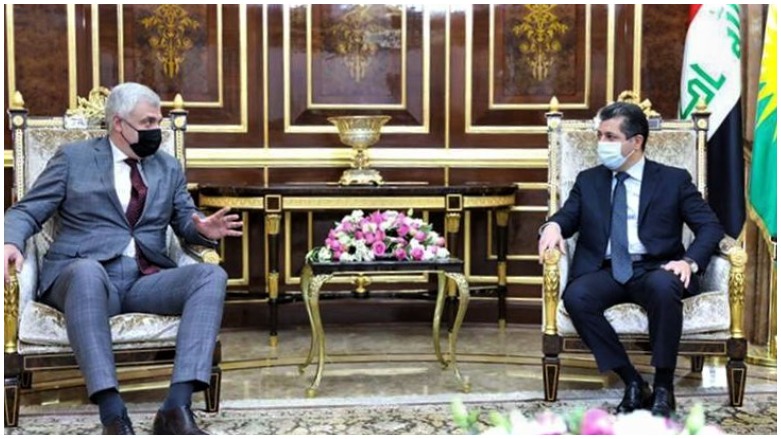Kurdistan PM says Baghdad shouldn't use workers' salaries to 'punish' region

ERBIL (Kurdistan 24) – Kurdistan Region Prime Minister Masrour Barzani on Tuesday discussed current events, Erbil-Baghdad disputes, and ties with Russia in a meeting with Moscow's ambassador to Iraq, Maxim Maximov.
At a meeting in Erbil, the two covered “the latest developments in Iraq and the region, with both sides stressing the need to further develop and strengthen relations between the Kurdistan Region and the Russian Federation, especially in the areas of investment and trade between the two sides,” read a statement on the Kurdistan Regional Government’s (KRG) website.
During the meeting, the Prime Minister touched on "outstanding problems," between Erbil and Baghdad, warning that it was crucial that "the issue of salaries and financial dues not be used by the federal government as a pressure card to punish the Kurdistan Region."
Barzani also restated "the Kurdistan Region’s willingness to settle all problems through dialogue and on the basis of the constitution," in particular, "the importance of implementing the Sinjar (Shingal) agreement in order to normalize the situation in the region in a way that guarantees reconstruction and the return of the displaced to their homes."
The federal government deployed additional security forces to Shingal on Monday as part of the second phase of an agreement to normalize the situation in the Yezidi-majority area where competing armed groups have been vying for influence in recent years.
Read More: Sinjar Agreement: Baghdad sends reinforcements as residents await 'third phase'
Before the so-called Islamic State overran Shingal in August 2014, it was home to some 200,000 residents, most of them members of the Yezidi (Ezidi) religious minority. The terrorist group proceeded to kidnap and massacre untold numbers of people and thousands of women and girls were forced into sexual slavery. Those atrocities are now widely recognized as genocide.
Some six years later, much of Shingal remains uninhabitable rubble, and very few of its former residents have returned to their homes. Tens of thousands of Ezidis from there and surrounding areas remain displaced in the Kurdistan Region while many others have fled to Europe and other areas abroad.
Editing by John J. Catherine
